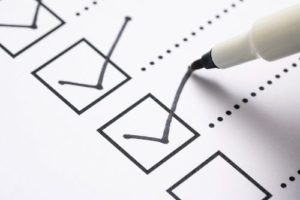“Clean driving record” is a term that you may have come across once or twice when searching for a job, but what does a “clean driving record” mean exactly? Although different employers have different requirements, if you are applying for a trucking job, most companies will require a clean driving record.
So, to help you out, we will go over the most common clean driving record definition, as well as how you can check your driving record and work towards cleaning it up.
What is considered a clean driving record?

A clean driving record is one that is free of accidents, moving violations, or points. While various trucking companies or employers may have different definitions on the specific criteria, most will include the aforementioned categories when requesting a clean driving record; meaning, for most people, a clean driving record is one that has none of the following:
- Accidents
- Moving violations (speeding tickets)
- Major violations, such as driving crimes
- Points on your license
Again, specific criteria may vary — for example, some employers may not care about a smaller speeding ticket a long time ago — so it is always worth double-checking with all relevant parties. However, if you manage to keep your driving record clear of all of these regardless, you will be able to rest easy knowing that you’re not only a safe driver, but that you also have a driving record that employers are looking for.
Do I have a clean driving record?
Now that you know what a clean driving record is, you may be wondering how you can check your driving record; perhaps you have some past violations and you are wondering if the points still apply. Luckily, checking your driving record is relatively simple to do. To see if you have a clean driving record, all you have to do is get a copy of your driving record, or Motor Vehicle Report (MVR), from your state DMV (Department of Motor Vehicles). Depending on your state’s DMV, you can usually request a copy in person, online, or by mail.
There do exist third-party sites that will offer to do this for you, but it could cost you extra money and be less reliable. While it may be something you had not considered doing before, it is worth checking your driving record every few years to double-check for any mistakes; this is especially important if you have a career that requires driving vehicles.
How do I get a clean driving record?
Of course, the easiest way to get a clean driving record is to simply drive safely. However, reality often gets in the way, and mistakes happen. As such, you may be wondering how you can clean up your driving record. As with most legal issues, the process for removing violations (or potential violations) from your record varies from state to state. However, there are some things that you can try:
- Go to driving school
Many states offer driving classes or courses as an alternative to adding points to your license after receiving a speeding ticket. Be sure to check to see if this is the case in your state.
- Contest driving tickets
If you feel that you have a good chance, it might be worth contesting your ticket. It may be as simple as convincing the court that you were wrongly cited or that there were extenuating circumstances. This could be enough to reduce your penalties or even dismiss them altogether.
- Pay all fines promptly
Fines and penalties can get worse if you leave them. Be sure to stay on top of any pending fines before they worsen.
- Wait out any points
In some states, points are removed from your driving record after a certain period of time, so it’s just a matter of waiting it out.
- Reach out to your DMV
There may be specific ways to clean up a driving record in your state, so it is always worth checking to see if you are doing everything that you can.
How far back does a driving record go?
Again, this varies from state to state, but most MVRs will go back anywhere from 3 to 10 years.
Hopefully most of your questions regarding driving records are now answered. For more information, you can visit the DMV website and select your state. If you have a Class A CDL, a clean driving record and more than a years’ worth of experience, you may be eligible to apply for a job at Matheson. Check out our current careers listings to view open positions, find out specific requirements, and apply today.

